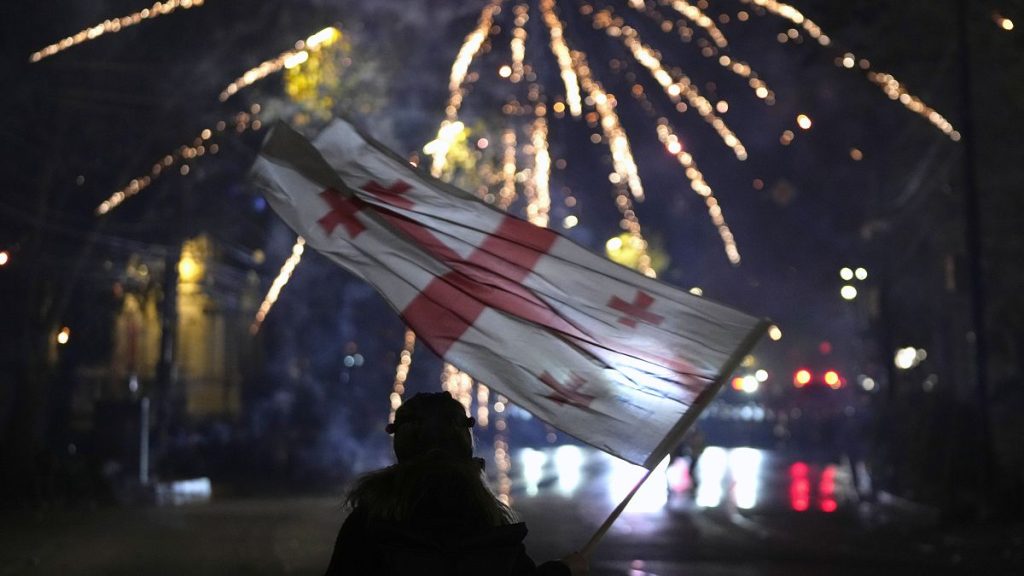The streets of Georgia have become a battleground between protesters and police, with the nation’s European Union aspirations at the heart of the conflict. Triggered by the government’s decision to postpone EU accession talks until at least 2028, the protests, now in their ninth night, have escalated into violent clashes. Police have responded with heavy-handed tactics, deploying water cannons and tear gas to disperse crowds. Over 400 protesters, including opposition leaders and activists, have been detained, and more than 100 people have sought medical treatment for injuries, including one protester in an induced coma after allegedly being struck by a tear gas canister. The escalating violence has drawn condemnation from Georgia’s pro-EU President Salome Zourabichvili, who accused security forces of “brutal terror and repression” and “gross violations of human rights.” The unrest also ensnared journalists, with over 50 injured while covering the events.
The current turmoil has its roots in the disputed parliamentary elections held on October 26th. The ruling Georgian Dream party retained control, but the opposition alleges vote rigging with the assistance of neighboring Russia, aiming to maintain the party’s Moscow-friendly stance. Viewed as a referendum on Georgia’s EU ambitions, the election results fueled existing tensions. The government’s subsequent decision to suspend EU accession talks until 2028, based on a European Parliament resolution criticizing the elections as neither free nor fair, ignited the widespread protests. The resolution highlighted Georgia’s “continued democratic backsliding,” attributing responsibility to the Georgian Dream party. International observers reported instances of violence, bribery, and double voting during the elections, prompting calls for a re-run from some EU lawmakers.
The protesters’ central demand is the adherence to Article 78 of the Georgian Constitution, which mandates every government entity to support European integration. They perceive the government’s actions as a betrayal of this constitutional principle and a move towards authoritarianism, reminiscent of the Russian regime. The protesters see their fight as a struggle against both the government’s suppression of democratic freedoms and its perceived alignment with Russia. They believe their persistent demonstrations, coupled with anticipated Western support, will eventually force the government to concede and hold new, fair elections under reformed laws.
The backdrop to this conflict involves the EU granting Georgia candidate status in December 2023, conditional on meeting the bloc’s recommendations. However, this process was already paused earlier in the year due to the enactment of a controversial “foreign influence” law, seen as undermining democratic freedoms. This law, along with other recently passed legislation, has fueled criticisms of the Georgian Dream party’s increasingly authoritarian tendencies and perceived pro-Moscow tilt. These laws, similar to those employed by the Kremlin, have been used to restrict freedom of speech and target LGBTQ+ rights.
The Georgian protests represent a complex interplay of factors: the desire for closer ties with the EU, concerns about democratic backsliding and alleged Russian influence, and popular frustration with the ruling party’s actions. The protesters view the suspension of EU accession talks as the culmination of the government’s authoritarian drift and a betrayal of the Georgian people’s aspirations for a democratic future aligned with European values. They are determined to continue their struggle, believing that sustained pressure, both domestic and international, will ultimately force the government to yield to their demands for fair elections and a return to the path of European integration.
The situation remains volatile, with the potential for further escalation. The government’s response to the protests will be crucial in determining the future trajectory of Georgia’s relationship with the EU and its internal political landscape. The international community, particularly the EU, will play a significant role in mediating the crisis and encouraging a peaceful resolution that respects democratic principles and the will of the Georgian people. The protests represent a pivotal moment for Georgia, a test of its commitment to democratic values and its determination to pursue its European aspirations.














